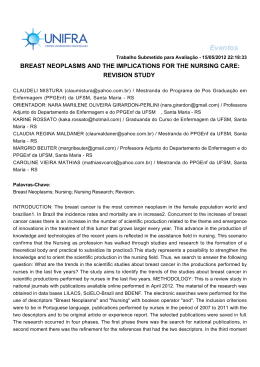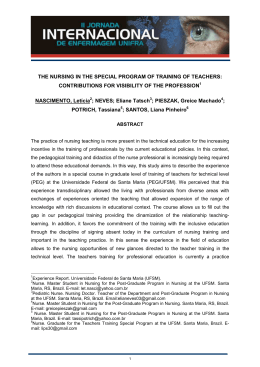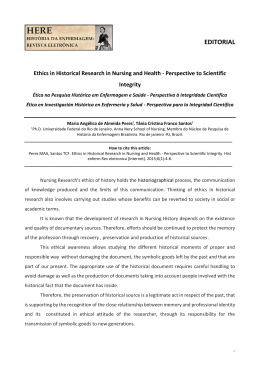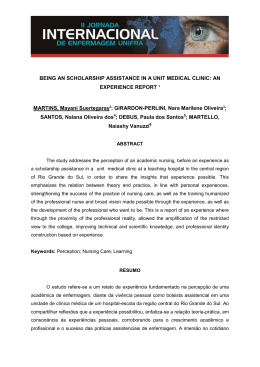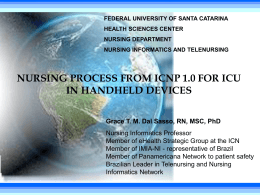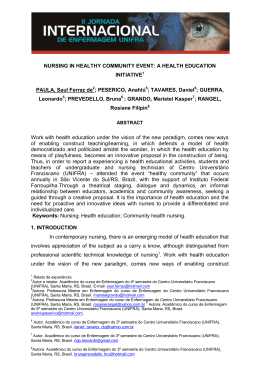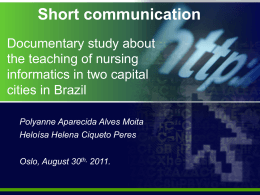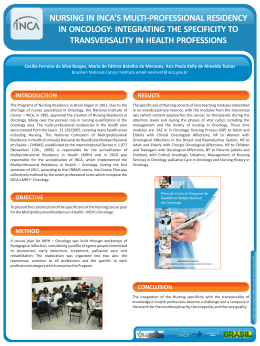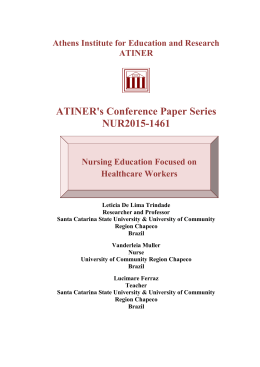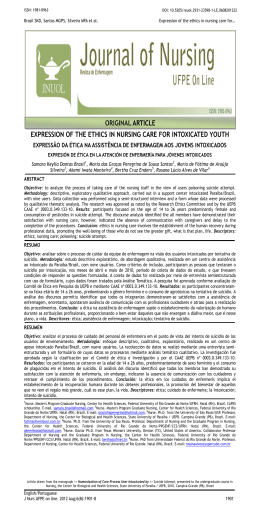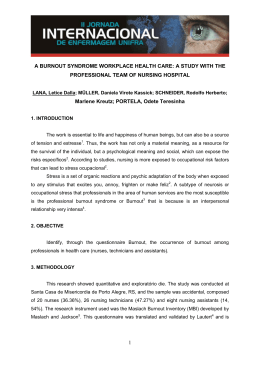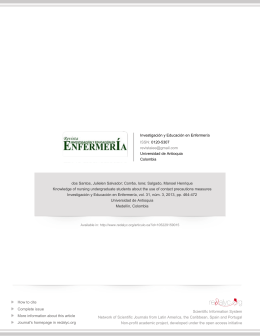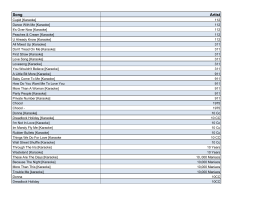THE HEALTH OF WORKERS IN NURSING: A BRIEF REPORT 1 FREITAS, Natiellen Quatrin2; BECK, Carmem Lúcia Colomé3; MAGNAGO, Tânia Solange Bosi de Souza4; DONADUZZI, Daiany Saldanha da Silveira5; DISSEN, Caliandra Marta6; SANGOI, Thais Picolin7; COELHO, Alexa Pupiara Flores8. ABSTRACT This study is a typical experience report that aimed to describe the experience of Nursing students about Health of Workers in Nursing, based on the proposed contents of a complementary discipline of graduation (CDG), offered by the Universidade Federal da região Sul do Brazil. The theoretical bases added to discussions contextualized during the CDG were used. These practices allowed moments of reflection for the students, since it enabled the understanding of the work process, as well as the knowledge of occupational hazards to which Nursing workers are exposed daily. Furthermore, it was possible to identify the relations between the health and the profession, besides the physical issues, covering in this context, the subject of life quality. Therefore is possible to conclude the essentiality in the ampliation in the discussion about workers health, in order to promote improvements in the current situation, considering the worker as part of this action. 1 Research work. Universidade Federal de Santa Maria (UFSM), Brazil. th Presenter. Undergraduation student of the 7 Semester of Nursing - Universidade Federal de Santa Maria/UFSM - RS. Memebr of the Research Group “Work, health, Education and Nursing” of UFSM. PROBIC/FAPERGS Scholarship. E-mail: [email protected] 3 P.H.D in Nursing, Associated Professor of Department of Nursing of UFSM. Vice-Leader of the Research Group “Work, health, Education and Nursing” of UFSM. 4 P.H.D in Nursing, Associated Professor of Department of Nursing and member of Program of PostGraduation in Nursing of UFSM. Leader of the Research Group “Work, health, Education and Nursing” of UFSM. 5 Nurse, Master´s in progress in the Program of Post-Graduation in Nursing of UFSM.. 6 th Undergraduation student of the 7 Semester of Nursing - UFSM. Memebr of the Research Group “Work, health, Education and Nursing” of UFSM/.PIBIC/CNPq Scholarship. 7 th Undergraduation student of the 7 Semester of Nursing - UFSM. Memebr of the Research Group “Work, health, Education and Nursing”. 8 th Undergraduation student of the 5 Semester of Nursing - UFSM. Memebr of the Research Group “Work, health, Education and Nursing” of UFSM. 2 1 Keywords: Occupational Health; Undergraduation Students; Nursing. 1. INTRODUCTION Occupational Health therm refers to an area of Public Health, that presents the relation between work and health as an object of study and intervention; It is worthwhile to highlight the determinants related, including: social, economic, technological and organizational, which respond by risk factors present in work processes of living conditions1. In the context of nursing, it is possible to verify that these workers are exposed to various daily loads that endanger the health, generating high rates of occupational accidents and diseases related to occupation2. Thus, it is understood that issues relationed to the health of the nursing workers need to be associated with biological matters, life conditions at work, as well as risk factors for accidents, and occupational diseases that contemplate the process. All this aspects justify the study, providing more visibility to this issue in order to reflect carefully the daily work of this class. 2. OBJECTIVE The objective of this report was to describe the living experiences of Nursing students about occupational health of Nursing Workers, based on the proposed contents of a complementary discipline of graduation (CDG) offered by the Universidade Federal da região Sul do Brazil. 3. METHODOLOGY This study is classified as a report of experience lived by undergraduate students of the 6th semester of the Universidade Federal da Região Sul of Brazil. It was provided by a classroom experience of complementary discipline of graduation entitled "Work and Occupational Health," which included the proposal for reflections and discussions about various subjects related to this theme, highlighting the Nursing workers. The classes took place once a week, being taught by teachers and/or Masters of nursing, with a workload of two hours per week during the second semester of 2011. Participated of the classes nursing 2 students of different semesters, masters students of the program of Post-graduation in nursing, Nurses and Nursing Professors of the university mentioned above. 4. RESULTS E DISCUSSION It is known that the work has a central role in the social insertion and this is essential for health3. However, when it is developed in unsuitable environments may causes disease, shortens the life and, perhaps, cause death4. The approach of this subject, from the classroom, allowed the students an understanding of the influence of work and its conditions for the workers health, related to the biological sphere and with emphasis to the reality of work of Nursing. Among the major diseases related to the factors mentioned above are the musculoskeletal disorders (MSDs), which have as the main risk factors: the organization of work, environmental factors and possible overloads in certain body segments in detriment of some movements5. Moreover, the experience allowed the analysis of the relation between the health of the worker with the subjectivity of the same, reflecting the representation of their specific form of work/wear, including mental health and the stress6. From this perspective, it was possible to contemplate the thematic of life quality of nursing workers, since the dissatisfaction with the work environment is capable of harming the general welfare of the workers, reflecting too on the quality of work performed. Considering the daily lives of nursing workers, it is possible to realize some misunderstanding in relation to occupational health, often caused by lack of preparation of these professionals, when they do not recognize the work as possible causative agent of health problems, added to the lack of information about risks to which are susceptible3. In this context, the discussions throughout the discipline allowed the reflection of the students regarding to the need of educative practices directed to these workers, attempting to guide them in order to reflect their own practice. Therefore, health education should be an ongoing process, creating possibilities of knowledge production, providing respect for the autonomy of each individual7. 5. CONCLUSION 3 The informations presented in this study permitted to understand the manner that the work process is being carried out, showing several occupational hazards with consequent increase in the rates of illness. Furthermore, it contributed to approach the subject of life quality of and work in the reflections performed, as well as the need for reflection by the workers, especially regarding to the Nurses health, ensuring the performance of their functions with worthy conditions. REFERÊNCES 1 Brasil MS. Doenças relacionadas ao trabalho: manual de procedimentos para os serviços de saúde. Brasília: Ministério da Saúde; 2001. 2 Sarquis LMM, Cruz EBS, Hausmann M, Felli VEA, Peduzzi M. Uma reflexão sobre a saúde do trabalhador de enfermagem e os avanços da legislação trabalhista. Cogitare Enfermagem. 2004; 9(1): 15-24. 3 Cavalcante CAA, Enders BC, Menezes RMP, Medeiros SM. Riscos ocupacionais do trabalho em enfermagem: uma análise contextual. Ciência, Cuidado e Saúde Maringá. 2006; 5(1): 88-97. 4 Junior HVL, Ésther AB. Transições, prazer e dor no trabalho de enfermagem. RAE Revista de Administração de Empresas. 2001; 41(3): 20-30. 5 Magnago TSBS, Lisboa MTL, Griep RH. Trabalho da enfermagem e distúrbio musculoesquelético: revisão das pesquisas sobre o tema. Esc. Anna Nery. 2008; 12(3): 5605. 6 Siqueira MM de. Relações de trabalho em hospitais de Belo Horizonte [tese] (Professor Titular) – Faculdade de Ciências Econômicas: Universidade Federal de Minas Gerais; 1991. 7 Freire P. Pedagogia da autonomia: saberes necessários à prática educativa. 36 ed. São Paulo: Paz e Terra; 1996. 4
Download
